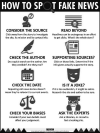The Covid-19 'infodemic': a new front for information professionals
- PMID: 32533803
- PMCID: PMC7323420
- DOI: 10.1111/hir.12311
The Covid-19 'infodemic': a new front for information professionals
Abstract
The virus, commonly known as COVID-19 which emerged in Wuhan, China, in December 2019, has spread in 213 countries, areas or territories around the globe, with nearly 144 683 deaths worldwide on 18 April 2020. In the wake of this pandemic, we have witnessed a massive infodemic with the public being bombarded with vast quantities of information, much of which is not scientifically correct. Fighting fake news is now the new front in the COVID-19 battle. This regular feature comments on the role of health sciences librarians and information professionals in combating the COVID-19 infodemic. To support their work, it draws attention to the myth busters, fact-checkers and credible sources relating to COVID-19. It also documents the guides that libraries have put together to help the general public, students and faculty recognise fake news.
Keywords: global health; information literacy; library and information professionals.
© 2020 Health Libraries Group.
Conflict of interest statement
There is no conflict of interest.
Figures
References
-
- Banks, M. (2016). Fighting fake news: How libraries can lead the way on media literacy. American Libraries Magazine. Available at: https://americanlibrariesmagazine.org/ (Accessed 14 April 2020).
-
- Barthel, M. , Mitchell, A. , & Holcomb, J. (2016). Many Americans believe fake news is sowing confusion. Pew Research Center, 15, 12. Available at: https://www.journalism.org/2016/12/15/many‐americans‐believe‐fake‐news‐i... (Accessed 14 April 2020).
-
- Child, D. (2020). Fighting fake news: The new front in the coronavirus battle: Bogus stories and half‐backed conspiracy theories are surging through the internet. Available at: https://www.aljazeera.com/news/2020/04/fighting‐fake‐news‐front‐coronavi... (Accessed 16 April 2020).
-
- Dempsey, K. (2017). “What’s behind fake news and what you can do about it? Information Today” , 34, 6. Available at: http://www.infotoday.com/it/may17/Dempsey–Whats‐Behind‐Fake‐News‐and‐Wha... (Accessed: 10 April 2020).
-
- Government of Pakistan . (2020). National Command and Control Centre for COVID‐19 in Pakistan. Available at: http://covid.gov.pk/ (Accessed: 15 April 2020).
MeSH terms
LinkOut - more resources
Full Text Sources
Miscellaneous



